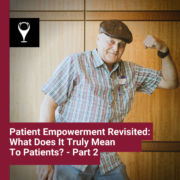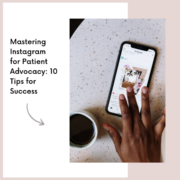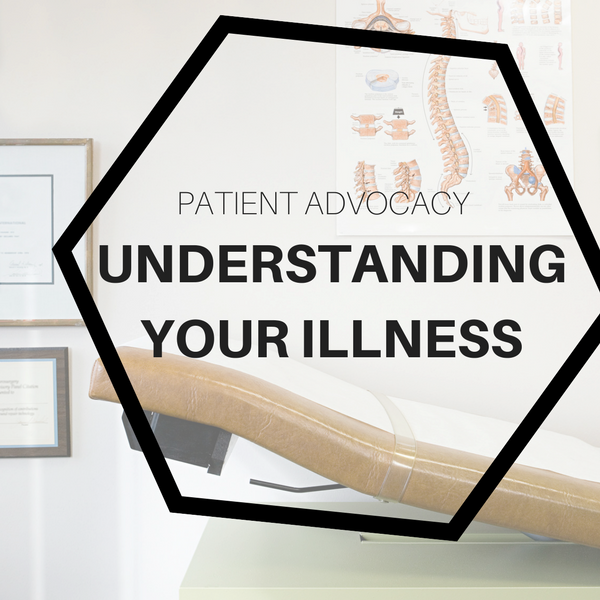Patient Empowerment Revisited: Part 2
Welcome back to the second part of this discussion on patient empowerment. In Part 1 we looked at self-advocacy and the importance of having access to information which allows us to take a more active role in our care. We also looked at how a team-based, partnership approach to care – one in which the patient is respected as a person – facilitates a more empowering environment.
In Part 2, we’ll look at the role of peer to empowerment and explore whether the term “empowerment” is even the right term to use. Finally, we’ll conclude with some thoughts on the need for systemic change and a shared vision to embed new solutions into healthcare systems and pathways.
Theme 5. Peer to peer empowerment
“Engagement with your community, bolsters our confidence with good information.” – Britt (@mewhinney).
Information, knowledge and the confidence to become a more active participant in our care also develops from engagement with other patients. As Conor describes it, “I find being part of patient groups empowering for so many things, including where to find information, other peoples experiences and above all, chatting with others who just understand.”
Piarella Peralta de Wesseling (@piarellaperalta), Patient Advocacy Lead at Diaceutics, is unequivocal in her belief in the collective wisdom and power of patient communities. “It is not clinicians nor industry nor government who have empowered me as greatly as the community of empowered individuals themselves,” she says. “No one has greater urgency to get it right, to evaluate and decide what best fits our lives than us facing the very challenges of the disease. People come to me and my fellow patient advocates to ask very simple questions that in the end just have two purposes, feeling heard, share in the knowledge of the devastating news that they have learned they have cancer, be in solidarity and then to know how they can make the best decisions relevant to them.”
Theme 6. Is ‘empowerment’ the right term to use?
When crowdsourcing these comments, I received some push-back on the use of the term ‘empowerment.’ To quote Piarella, the term itself “creates a sense of power differential and that is perhaps intuitively contradictory to the notion that each human has a right to be autonomous and self-determined.”
Kristie Konsoer (@kkbadger1) agrees. “For me, empowerment means taking action/speaking up so I feel like I’m participating in and influencing my health care,” she explains. “I empower myself. Empowerment comes from within. An authority can’t give it to me, but we can work together toward the same goals.”
Here are some more quotes expressing similar viewpoints.
“For what it’s worth I think patient empowerment is lacking. It implies patients need authority given to them by another. Patient rights seem more fitting. Patients have rights, and doctors and healthcare providers must ensure those are not infringed but are guaranteed.” Mark Samber (@MarkMyWords67).
“I cringe at the term! Despite its well-meaning origins, it’s a conversation stopper within our hierarchy of medicine.” – Carolyn Thomas (@heartsisters).
“Empowerment is a convenient shorthand that smacks of condescension, as if someone is deigning to award me some of their power when I presumably have little or none. How about respecting patients and taking our input seriously. We can strengthen our own power by exercising it.” – Nancy Seibel (@nancylseibel).
“Like everything, thoughts on this evolve. #Patientsinvolved means patients can be as passive or pro-active as they like, but it also means they are heard and asked about their thoughts and needs. Empowerment perhaps is self-empowerment. Not that patients are ‘given power’?” Sharon Thompson (@sharontwriter).
“I think patients like to ‘feel’ empowered, because the word connotes being engaged, participatory and pro-active. At the same time it can be overused, although when people say they’re empowered by ‘xyz’, there’s ‘power’ in that.” – Cathy Leman (@dammadbrstcancr).
“Patient empowerment is a concept I believe in, but as a patient activist, I find the term somewhat passive. I’m also concerned that power is not something men diagnosed with breast cancer feel they have. Faced with a labyrinth of medical institutions and pink charities geared towards dealing with this predominantly female disease, those of us in the one percent cohort feel virtually powerless.” – Rod Ritchie (@malefitness).
“Not a big fan of the term because what exactly does it even mean? Empowered vs powerless, or what? Also, what empowers each of us varies so much as we are all unique. It’s another trendy buzz word. But if it works for some, that’s fine too.” – Nancy Stordahl (@nancyspoint).
“I use the word ‘empower’ in my mission statement but only believe it is worthy of a mission statement or used anytime when ACTION is taken. A word is empty without the tools/resources to use it.” – Terri Coutee (@6state).
Theme 7. Empowerment requires a systemic approach
The final theme centered around the need for a systemic shift in how patients are treated in the healthcare system. As Julia (@bccww) put it, “empowerment would be health care services being appropriately funded and accessible to enable those with serious/long term chronic conditions to live well. It’s about being enabled (for me) to manage my long term health conditions, live well with them but with access to support and/or treatment (if I need it) to keep on course.”
Elizabeth Nade (@elizabethnade11), who prefers the term “patient activism”, points out, “I am already empowered. I am seeking change to the current healthcare model because it is insensitive and unresponsive to the needs of patients and their families. I want to challenge the relationship to affect change.”
Similarly, Patty Spears (@paspeers88), emphasises the need for systemic change. “I don’t like the term and how it’s usually used. Even unempowered patients need good quality care, not just empowered patients. Rather let’s ensure equal and high quality care for ALL patients. Putting the burden on the patient (to be empowered) is a bad idea in my book.”
Cardiologist, David Lee Scher MD (@dlschermd), adds the physician voice to the discussion. “Education, awareness and tools are what is needed for patients to self-manage chronic diseases and navigate the healthcare system,” he says. “What you call it doesn’t matter. Labels and phrases (engagement, etc) in healthcare have yet to translate to better care.”
A Shared Vision
To conclude this discussion, I’m turning to Liz Ashall Payne (LizAshallPayne), CEO and Co-Founder @OrchaHealth, a passionate advocate for healthcare transformation through digital and mhealth. I really like what she has to say about working together on a shared vision that puts the patient at the center of the entire healthcare ecosystem.
“To truly support ‘patient empowerment’ we have to think far broader than the patient, we must also make sure we are empowering those that sit around the patient.
We need to empower Health Care systems to be incentivised to support this vital work.
We must educate and empower our health care workforce to know how to empower patients
We must support innovators to know what patients’ needs are, and how to embed new solutions into healthcare systems and pathways.
Above all we must COLLABORATE with a shared vision.
The current COVID crisis has really brought the whole system together to drive digital uptake amongst our patients and populations, but we are not finished, we must do more, and there has never been a better time to do so.”

A Stanford Medicine X e-Patient scholar, Marie Ennis O’Connor is an internationally recognized keynote speaker, writer, and consultant on global trends in patient engagement, digital health and participatory medicine. Marie’s work is informed by her passion for embedding the patient voice at the heart of healthcare values. She writes about the experience of transitioning from breast cancer patient to advocate on her award-winning blog Journeying Beyond Breast Cancer.










